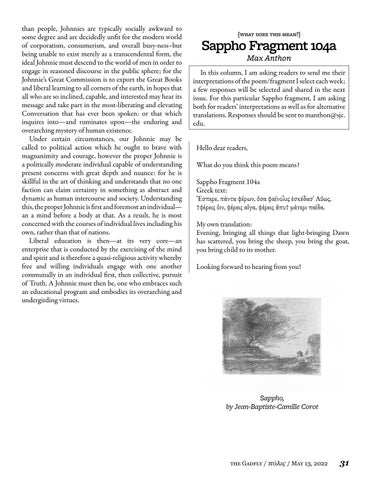than people, Johnnies are typically socially awkward to some degree and are decidedly unfit for the modern world of corporatism, consumerism, and overall busy-ness–but being unable to exist merely as a transcendental form, the ideal Johnnie must descend to the world of men in order to engage in reasoned discourse in the public sphere; for the Johnnie’s Great Commission is to export the Great Books and liberal learning to all corners of the earth, in hopes that all who are so inclined, capable, and interested may hear its message and take part in the most-liberating and elevating Conversation that has ever been spoken: or that which inquires into—and ruminates upon—the enduring and overarching mystery of human existence. Under certain circumstances, our Johnnie may be called to political action which he ought to brave with magnanimity and courage, however the proper Johnnie is a politically moderate individual capable of understanding present concerns with great depth and nuance: for he is skillful in the art of thinking and understands that no one faction can claim certainty in something as abstract and dynamic as human intercourse and society. Understanding this, the proper Johnnie is first and foremost an individual— an a mind before a body at that. As a result, he is most concerned with the courses of individual lives including his own, rather than that of nations. Liberal education is then—at its very core—an enterprise that is conducted by the exercising of the mind and spirit and is therefore a quasi-religious activity whereby free and willing individuals engage with one another communally in an individual first, then collective, pursuit of Truth. A Johnnie must then be, one who embraces such an educational program and embodies its overarching and undergirding virtues.
{what does this mean?}
Sappho Fragment 104a Max Anthon
In this column, I am asking readers to send me their interpretations of the poem/fragment I select each week; a few responses will be selected and shared in the next issue. For this particular Sappho fragment, I am asking both for readers’ interpretations as well as for alternative translations. Responses should be sent to manthon@sjc. edu. Hello dear readers, What do you think this poem means? Sappho Fragment 104a Greek text: Ἔσπερε, πάντα φέρων, ὄσα φαίνολις ἐσκέδασ' Αὔως, †φέρεις ὄιν, φέρεις αἶγα, φέρεις ἄπυ† μάτερι παῖδα. My own translation: Evening, bringing all things that light-bringing Dawn has scattered, you bring the sheep, you bring the goat, you bring child to its mother. Looking forward to hearing from you!
Sappho, by Jean-Baptiste-Camille Corot
the Gadfly / πόλις / May 13, 2022
31










